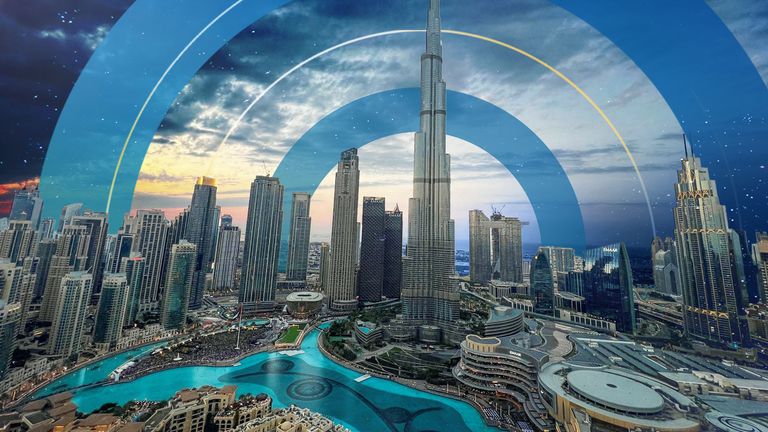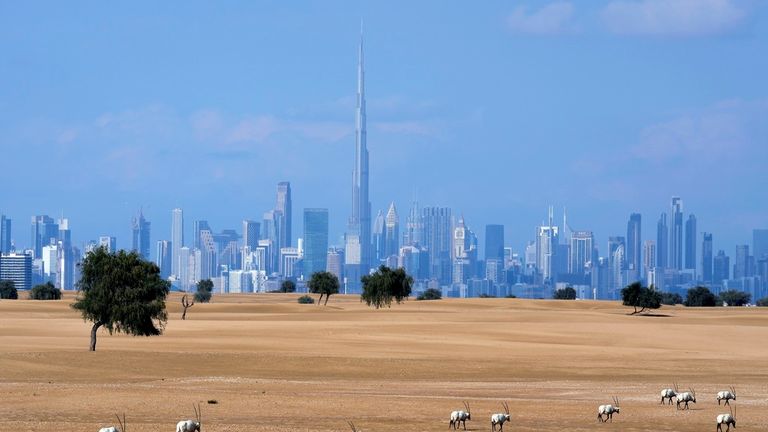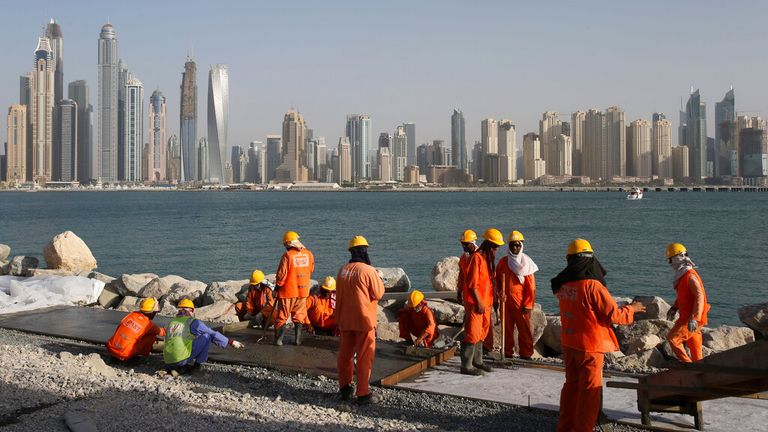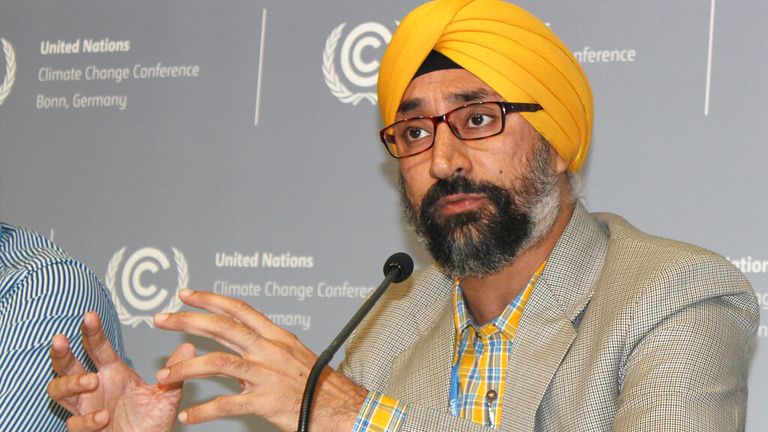Dubai may be the last place you'd associate with a climate conference - but could it hold the answers?
For two weeks the emirate of Dubai is the epicentre of global climate action, hosting the United Nations COP28 summit from Thursday.
Wednesday 29 November 2023 03:32, UK
Dubai is probably not the first city that springs to mind when you're thinking sustainability.
As you step off the plane, a wall of heat hits you in the face, even now, in winter, in the middle of the night. At 1am on Tuesday morning it was 26C.
Inside the terminal you're cooled by air conditioning, and, yes, a refreshing breeze from an indoor waterfall.
Baggage reclaim has mirrored ceilings and animated screens on the pillars, a booth selling fine whiskies and services to help plan a luxury break here.
Opulence drips off every corner of this dense city, which only 50 years ago was just a sleepy town in the desert.
More than 400 sky-scrapers guzzle energy for air-conditioning, swimming pools, and facades with displays that light up like funfair rides at night. Construction is all around as the city rapidly expands, with banners for new luxury living complexes.
Drinking water comes from plastic bottles, while gas-hungry plants desalinate water for the rest of the home.
And before I could even get to the indoor ski slope, from the hotel on the first morning I spot flash cars - a lime green Dodge challenger, a bright purple Lamborghini SUV and Mercedes 663 - and super yachts.
Yet for two weeks, starting this Thursday, the emirate of Dubai is the epicentre of global climate action, hosting the United Nations COP28 summit.
Though right now you'd hardly know it - there is so far very little of the COP branding that was plastered over seemingly every facade and lamppost at COP27 last year in Sharm El Sheikh, Egypt, or in Glasgow at COP26.
Read more: What is COP28, who is going, and what's at stake?
'Contrast between opulence and urgency'
Harjeet Singh, head of global political strategy at civil society body Climate Action Network, told me as he arrived in Dubai: "I'm struck by the stark contrast between the city's opulent development model and the urgent actions needed to resolve the climate crisis."
Just last week a United Nations body warned the world is on course for a staggering 2.5C of warming, far above the 1.5C global goal, making each COP more urgent than the last.
This year is "near certain" to the hottest ever, with elevated temperatures exacerbating drought and wildfires.
And for those advocating for countries like India or Kenya that are already being battered by amped up weather, COP is an opportunity you can't afford to miss.
Mohamed Adow, who runs energy and climate think tank Power Shift Africa, called it "very strange" for the world to be working out its collective next steps to tackle climate change "in a country responsible for massive oil production" - although it is Abu Dhabi rather than Dubai that has the oil.
"But the COP is the only forum we have where vulnerable countries have a platform and an equal vote," he said.
Last year's COP27 in Egypt delivered a commitment from all 190-odd countries to set up a fund to pay for loss and damage from climate change in developing countries (which do very little to cause it).
The landmark decision came after 30 years of fierce campaigning at COPs, where the likes of Adow and Singh could stare rich, polluting nations in the eye.
This year he wants to "build on that momentum" from COP27 and get cash flowing into the fund.
Mr Singh added that a bizarre benefit of hosting the COP in Dubai is that "it reminds us that the opulence of the elite and a development model steeped in fossil fuels, championed by a select few corporations and promoted by rich countries, is at the root of our crisis".
An Oxfam report last week found the richest 1% of humanity emits as much planet-heating pollution as the poorest two thirds.
Why we can't be too picky
But the point, and unique opportunity, of a COP climate conference is that every country has a seat at the table. That also means everyone is in some way accountable for what is agreed.
Hence different regions take it in turns to host the COP each year, with the UAE hosting COP28 on behalf of Asia and the Pacific.
And for many, having an oil state like the UAE as this year's host may be key to success. If fossil fuels are responsible for the majority of climate change, they need to be a part of the energy transition to a cleaner future, too.
Though that claim was stretched almost to breaking point on Monday when bombshell allegations accused the presidency of using COP to strike more oil deals.
The UAE COP presidency is "doing things differently", they told me yesterday, by "bringing everyone to the table… [including] the energy industry".
The Gulf state also has strong links with the global north and south, with potential to bridge divides on divisive issues like the loss and damage fund.
And it has used some of its vast fossil fuel wealth to build huge solar and nuclear projects at home and abroad.
The UK's stalled nuclear power programme could certainly use some of that expertise. Meanwhile, it is a huge importer of refined oil products from the UAE, and is responsible for far more emissions historically.
That makes it hard for Britain to point the finger, though it has been a climate leader until recently.
But as it now retreats from that position, it becomes harder still for Britain to ask others to take action. Action we desperately need.



